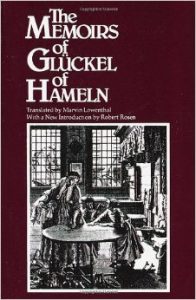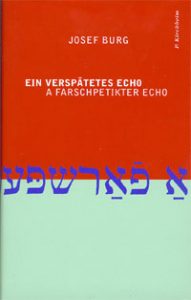Glückel of Hameln (1645-1724) was a remarkable woman. Not only could she read and write – in a time when most women had no formal education at all -, she also proved to be an energetic business woman after the early death of her first husband. That involved also extensive traveling in a time when this was difficult and dangerous. And on top of it the mother of fourteen children wrote the first autobiography of a woman in Germany.
Glückel’s memoirs were not written with the intention of a publication. They were meant as a distraction after her beloved husband’s passing and also with the idea to let her twelve surviving children (two more children had died early) and countless grandchildren know where they came from. There is also a strong educative element in her writing: look what happened to us and our friends, family and neighbors and learn from it! And learn to understand that you need to trust in God, but you need to be also wise in your own decisions.
As the name indicates, Glückel was born in Hameln, and got engaged at the age of 12, as was the habit at that time, to a boy called Chajm to whom she was married two years later. The young couple set shop in Hamburg, lived first with Chajm’s parents before they could afford their own small home.
Child after child was born while Chajm became a trader in gold, pearls and jewelery with a good hand for business. Although the marriage was arranged at an age that seems unsupportable from the point of view of today and was concluded in a rather business-like manner, Glückel and her husband seem to have been a good match. She speaks with the greatest expressions of respect and love of her husband, who seems to have been always attentive and respectful toward her and her family and the mutual children. His temper was obviously more on the soft side and as much as he enjoyed his trade and the money he made with it, the well-being of his family seems to have been his only real concern.
When he died at the age of 44, it must have been a catastrophe for his widow who was from one moment to the next alone and with very little funds but had to support many children who were still living with her at that time. But somehow she made it: against all odds, she keeps the business running, travels to fairs and business partners in Germany and Holland. But it came at a price: we can feel from her writing that at times she must have been completely worn out. When an offer from a rich banker from Metz to marry him arrives, she gives in, hoping that in her old age she will have a comfortable home after so many hardships. But her second husband goes bankrupt, she loses all her savings and has to live in her last years, again widowed with one of her children.
This is a remarkable book, not only because it is the first autobiography written by a woman from Germany. Also Glückel’s life was everything than dull and average, although she must have been a modest person that frequently blamed herself for her own mistakes; once she writes about a successful business transaction she never forgets to thank God or to mention the part that other people had in this success.
Since the book was meant for her family members, she refrains from mentioning the names of some persons that behaved badly towards her or her first husband when these persons were still alive at the time she wrote the autobiography. On the other hand she describes her emotions very openly when something bad happened to her or someone from the family. As a reader, I could not help but to admire her for her persistence when it came to do the best for her family. She comes across as a strong, very modest woman with an incredible energy and family sense.
The book is touching in itself as the story of a woman in very hard times. But it offers also a lot of insights in the everyday life of people in Glückel’s days, and especially in the life of the Jews.
Jews were not people with equal rights at that time and that included in most places that they had to pay Leibzoll, a kind of customs duty for themselves when entering a town, a deeply discriminatory act only applied in relation to the Jewish part of the population. Since Germany was divided in more than 2000 independent territories, traveling was for Jews extremely difficult. Additionally there were big differences in the living conditions of the Jews depending on the place where they lived.
In Altona, now a suburb of Hamburg, then an independent town that belonged to Denmark, the situation was very satisfactory for the Jews. The Danish King was known for his liberal opinions and was considered a friend of the Jews.
In neighboring Hamburg the situation was different: the Senate, the representative government body of the rich traders and bankers was rather friendly to the Jews; the Burgerschaft, the lower house of the Hamburg parliament on the contrary made life for the Jews very difficult by introducing rules that made it almost impossible for Jews to live in Hamburg. (Exempted from these harsh rules were the Portuguese Jews, descendants of Jews from Portugal who had settled in Hamburg after the reconquista; the Teixeiras, the de Castros and other Sephardic families were already considered as “real” Hamburgers and held influential positions in Hamburg; a certain rift between the Sephardic and the Ashkenazy Jews is clearly visible from Glückel’s writing. Although they shared the same belief, there seems to have been very little contact between these two groups. The sophisticated Sephards seem to have thought not too highly of their Ashkenazy brethren.)
Even worse was the situation in places like Leipzig, an important trading place that most Jewish traders visited twice a year – but Leipzig had for a reason the reputation of being a particularly anti-Semitic town that exposed Jews regularly to harsh treatment and extortion.
It may be rather strange for us readers today that Glückel is always so concerned about money. There is not a single page and for sure not a single characterization of a person that forgets to mention the exact amount of money someone’s fortune is worth.
To marry off her children to a good, i.e. a wealthy family, is the major concern for her and her husband. The wedding “market” was small and match makers seem to have been an extremely important institution at that time. Marriage was the chance for upward social mobility and that was the main concern for parents at that time. In lucky cases – like obviously in Glückel’s first marriage – love developed once the complete strangers were married and got to know each other. But it seems to be the exception, not the rule at Glückel’s time.
This – for us – obsession with money has of course a reason: money provided a limited protection for the fragile existence of the Jews at that time. It was important not in itself, but as a means to buy favours, ensure loyalties, pay off extortionist governments, assure a comparatively elevated social status in the Jewish community. As a reader we never get the intention that Glückel or her husband were gready people; if necessary, they part easy with their money. But it wouldn’t have been reasonable in their position with so many children not to permanently think about their pecuniary situation.
Glückel’s autobiography also reflects political events, for example several wars which affected the life of the family or of friends and business partners. A particularly happy moment is the participation of the Prussian Crown Prince as a guest at the wedding of one of her children. I found it also extremely interesting to read about how much the Jews in Germany were affected by the appearance of the “false messiah” Sabbatai Zevi who was Glückel’s contemporary, although he lived far away, in the Ottoman Empire.
Another aspect of Glückel’s writing that I find fascinating are her descriptions of her or her husband’s traveling. As already mentioned, traveling was no fun, especially for Jews. And there were pirates, robbers, or marauding soldiers all over the place. (One of the rare funny moments in the autobiography is also related to a travel experience; it involves a good servant of Glückel who got a drinking problem – but I will not give away the story here.) Hamburg saw several pandemics at Glückel’s time, most notoriously the plague which spread a fear of visitors from Hamburg all over Germany for many years, a fear for which Glückel gives us readers also a very disturbing example in her autobiography.
The book is also rich in descriptions of Jewish life, the importance of community life and of celebrating the big feasts together. All in all this book was an interesting and touching reading experience, and I enjoyed it thoroughly.
A word about the manuscript: Glückel wrote the manuscript in Hebrew script and in Western Yiddish language. Western Yiddish is even closer to Standard German than its Eastern Yiddish variation. The original text reads like an archaic German with plenty of Hebrew loan words; grammar, syntax and about 90% of the vocabulary are German.
The original manuscript was passing within the family from generation to generation; the first publication was issued in 1896 in Yiddish; Bertha Pappenheim, a descendant of Glückel – readers of the book Studies on Hysteria by Josef Breuer and Sigmund Freud know her as Anna O., one of the most famous case studies in the history of psychoanalysis – , translated the book 1910 in German for a non-public edition that was circulated in the family; in 1913 a second German edition followed, this time for a general audience. Since that time also translations in other languages (also two times in English) have been published.
A truly fascinating autobiography!
The Memoirs of Glückel of Hameln, transl. by Marvin Lowenthal, Schocken Books 1987
© Thomas Hübner and mytwostotinki.com, 2014-5. Unauthorized use and/or duplication of this material without expressed and written permission from this blog’s author and/or owner is strictly prohibited. Excerpts and links may be used, provided that full and clear credit is given to Thomas Hübner and mytwostotinki.com with appropriate and specific direction to the original content.





 Facebook
Facebook RSS
RSS Twitter
Twitter